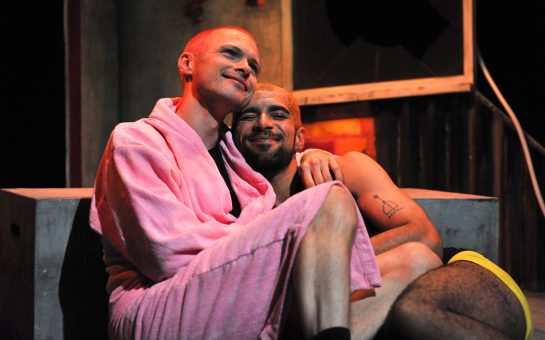Hollywood A-lister Benedict Cumberbatch is set to play code-breaker and late employee of Manchester University Alan Turing in a new biopic out next year.
However The Imitation Game, which also features Keira Knightley as Turing’s love interest Joan Clarke, has been criticised for downplaying the scientist’s homosexuality.
Alan Turing is regarded as the father of modern computing and was the deputy-director of the computer laboratory at Manchester University where he helped develop the software for the Manchester Ferranti Mark 1, one of the earliest computers.
He committed suicide in 1954, two years after he was convicted for homosexual conduct – It wasn’t until 1969 that male homosexuality in England was decriminalised.
With this in mind his biographer, Andrew Hodges, recently spoke out against the emphasis on Turing’s relationship with Clarke in the film script telling The Sunday Times that film makers ‘built up the relationship with Joan much more than it actually was.’
Although Turing was engaged to Ms Clarke, who he worked with at Bletchley Park during the war, it was, according to Hodges, a “brief” engagement.
The issue is not that Clarke will feature in the film – it is true that Turing and Clarke were friends and colleagues – but that the casting of such a high-profile actress as Knightley suggests the filmmakers are, indeed, overplaying the one main heterosexual relationship in Turing’s life to the exclusion of his same-sex love affairs.
As yet there has been no word on an actor being cast to play the youth Arnold Murray, despite Turing’s relationship with Murray being the reason for his conviction in 1952 and subsequent suicide.
In the early 1950s, gay men were liable for prosecution under the 1885 Criminal Amendment Act. In 1952 alone 1,600 men were charged, although Turing was spared the typical sentence of two years imprisonment.
Instead he was given weekly injections of the female hormone oestrogen in an attempt to suppress his homosexuality by chemical castration. Soon after he committed suicide by poisoning himself.
The Liberal Democrat peer Lord Sharkey put forward a private member’s bill earlier this month supporting a statutory pardon for Turing. The bill is expected to undergo a third reading at the end of October.
Yet, last year the government refused to grant pardons to 49,000 gay men, now dead, who were also convicted under the 1885 Criminal Amendment Act. That number included Oscar Wilde, who also had a heterosexual relationship during his lifetime – with his wife Constance.
The casting of Ms Knightley in The Imitation Game suggests that audiences are not yet ready for espionage and war films where characters are explicitly homosexual.
For Benedict Cumberbatch it may not be too much of a challenge to express Turing’s true sexuality regardless of the efforts of the script. He portrayed a pre-1969 British gay man in the 2011 remake of Tinker, Tailor, Soldier, Spy, a film about life in MI6 during the Cold War.
In that film there is a short sequence where his character, civil servant Peter Guillam, appears to break up with this his gay lover to avoid being vulnerable to blackmail. The whole sequence is shown without dialogue or explicit sexual intimacy, so that audiences are spared having their viewing experience interrupted by too much gay subtext.
It would be shame if The Imitation Game were to continue this trend.
Picture courtesy of Sara Zizza via Flickr, with thanks.
For more on this story and many others, follow Mancunian Matters on Twitter and Facebook.



